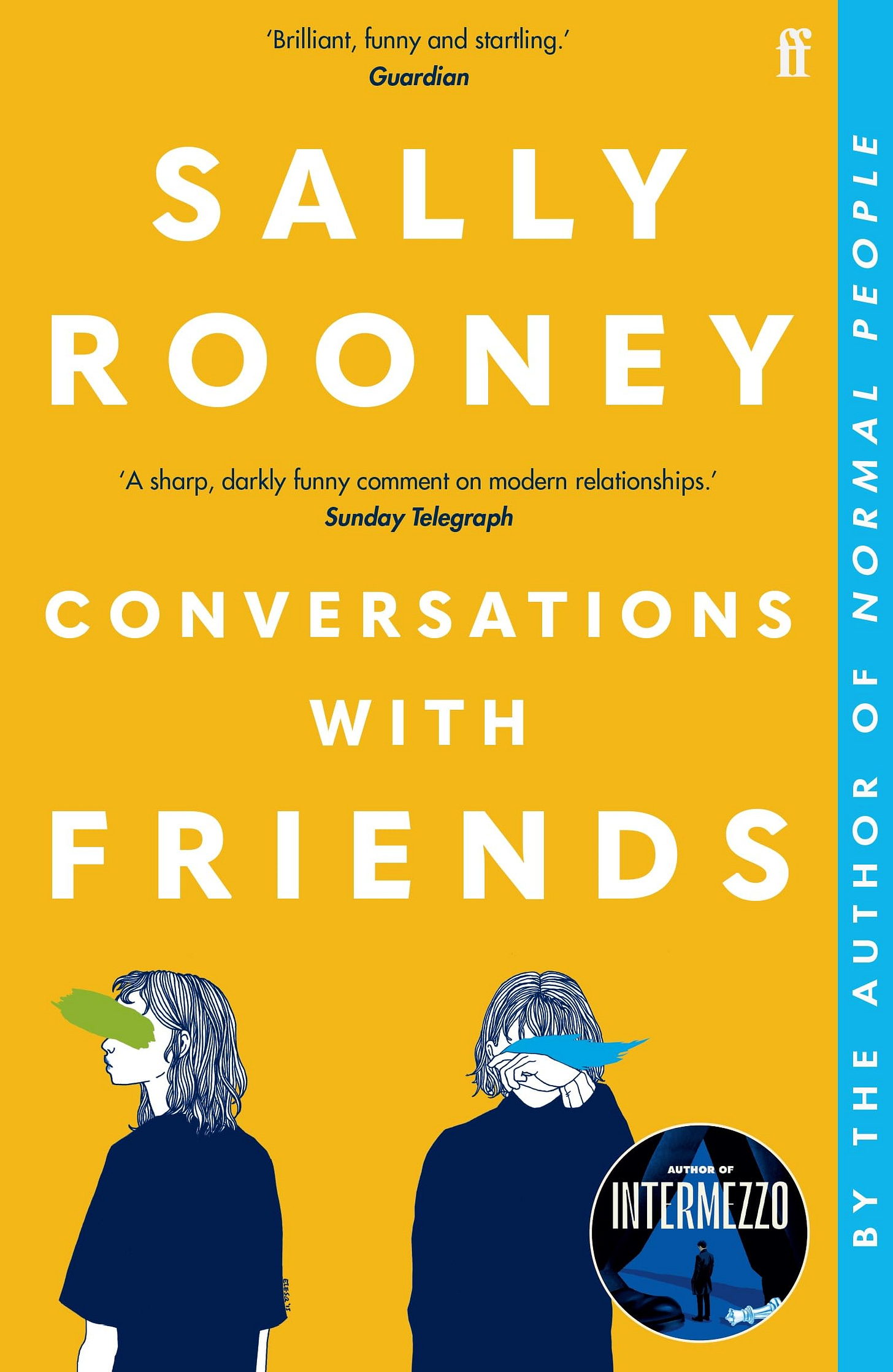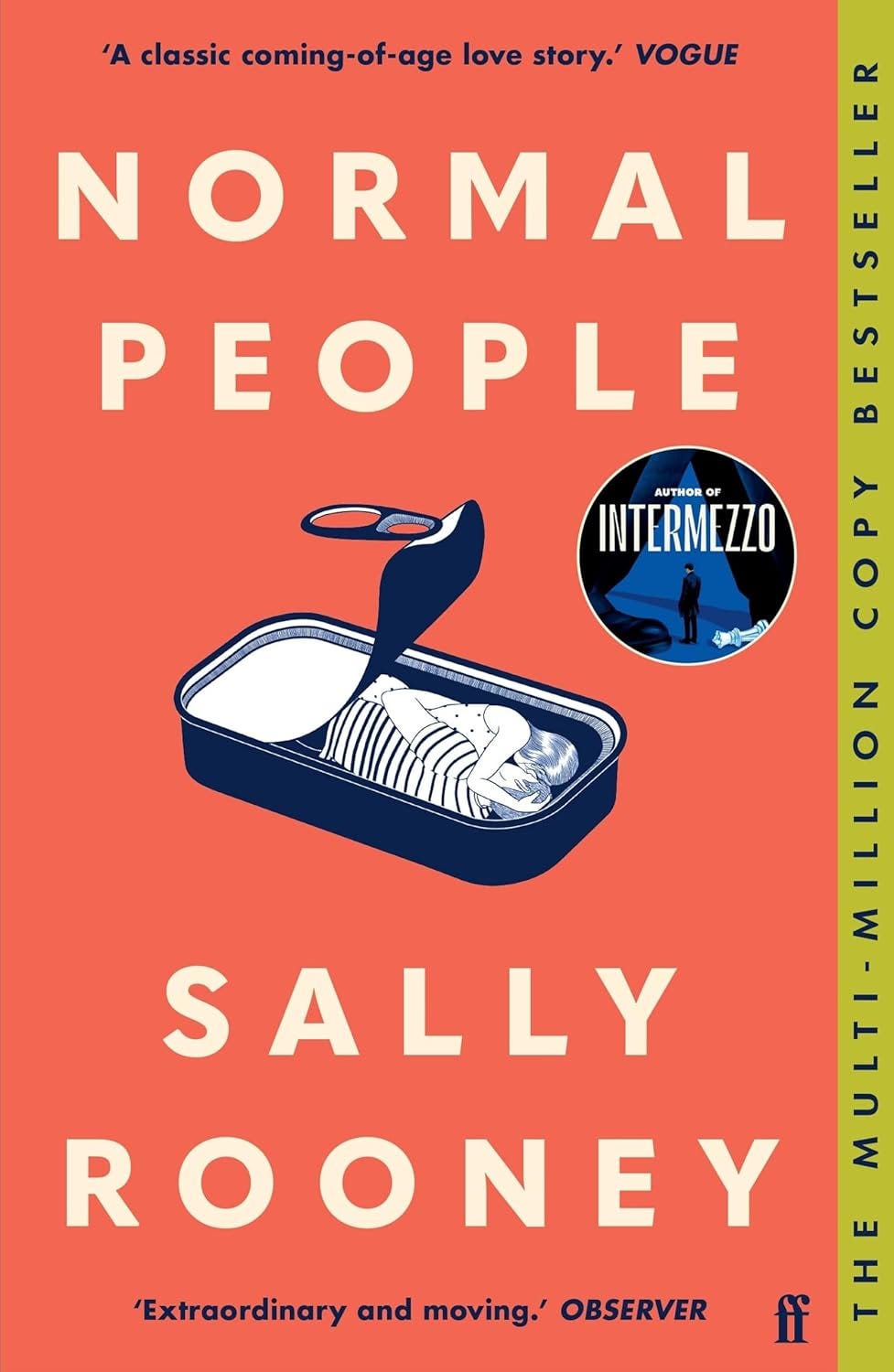I was nineteen when I first read Sally Rooney’s Conversations With Friends, and it was one of the first books I read as an adult that exactly captured the complexities of adolescence. Like the protagonist, Frances, I was a university student at the time - but unlike her, I was navigating my studies in the midst of a global pandemic. Nineteen is a confusing age under normal circumstances; you can imagine how much more disorienting it was in that context.
Whether consciously or not, I often turn to books to help understand my own emotions a little better, to find language for things I can’t articulate, or to feel less alone in whatever it is I’m experiencing. Reading Conversations with Friends was the epitome of that, because reading about Frances was like looking into a mirror. As a character, she is made up of many of the contradictions I see in myself: intellectual confidence coupled with emotional uncertainty, a desire for control despite deep vulnerability, and a strong sense of independence that often does more harm than good. Tick, tick, tick.
I’m sure it’s not surprising that I felt quite aggrieved when upon finishing the book, I opened Goodreads to find a lot of people calling Frances ‘unlikeable’ in their reviews.
But that’s exactly why I love Sally Rooney’s books. Her characters are not written with the intention of being perfect or palatable or ‘likeable’, they’re just human beings. Rooney’s novels often centre around characters navigating adulthood and their personal relationships, which she writes with a degree of verisimilitude that I haven’t found with many other authors.
Perhaps this is why one of the biggest criticisms of Rooney’s work (besides her lack of quotation marks, as if she was the first author to ever make that stylistic choice) is the prevalence of miscommunication. She gives us characters who are conflicted, avoidant, often struggling with emotional intimacy. People who long to be known but struggle to communicate, who seek connection yet recoil from vulnerability. Whether platonic, familial, or romantic, the relationships in her novels are always complicated, emotionally charged, and rife with some kind of power dynamic, whether the characters are aware of it or not.
The way Sally Rooney writes about relationships is real. We often don’t like to see reflections of ourselves and how we live, but Sally Rooney is still holding the mirror up to us. As readers, we’re left to reckon with the distance between what we feel and what we say.
When it comes to reading Sally Rooney’s novels, I think her work is best read in publication order, so you can trace how her writing has evolved over time. Normal People is by far her most popular novel, but its prominence and mislabelling as a ‘romance’ can often cause people to go into Rooney’s work with the wrong expectations. Sally Rooney is a literary fiction writer, and approaching her work with that knowledge helps to understand her work and her aims a lot better.
Conversations With Friends (2017)
Conversations With Friends follows university student Frances and her best friend/ex-girlfriend Bobbi, who become entangled with an older, sophisticated married couple Melissa and Nick. It examines the complexities of interpersonal relationships and power dynamics, using Frances and Nick’s eventual affair as the primary lens for exploration.
What makes this book so striking is how quiet it is - there’s not a lot of plot, but everything still feels high-stakes because of the emotional intensity buried into the character’s relationships. One of the main themes is mis/communication, and how hard it can be to say what we really mean. Power dynamics form a lot of the novel’s basis - between lovers and friends, but also in how Frances relates to herself and her own class background. It’s a very relatable portrait of the awkwardness and difficulties of being in your 20s, when you don’t yet have the experience of navigating complicated relationships in your life.
Read this first if: you’re looking for an introspective, character-driven novel about youth, complex relationships, and hierarchies of power.
Normal People (2018)
Normal People follows Connell and Marianne, two teenagers from a small town, as they drift in and out of each other’s lives throughout the years.
This book isn’t a ‘romance’, but Rooney accurately captures the awkwardness, miscommunication, and yearning that comes with young love. Throughout the novel, Connell and Marianne are magnetically drawn together over and over, even though they both struggle to say what they mean or ask for what they need.
A big theme (that is often overlooked) in the novel is class. Connell comes from a working-class background, while Marianne is wealthy, and that difference significantly shapes the way they see the world and themselves, along with how they each navigate the relationships in their lives. It also explores mental health, specifically in the context of Ireland, and the difficulties of trying to figure out who you are.
Read this first if: you’re looking for an unconventional will-they-won’t-they love story, deeply embedded in the cultural context of social class and attitudes toward mental health in Ireland.
I wrote more about Normal People (and Sally Rooney) in this post:
you're reading sally rooney wrong
TW: this post contains discussions of mental illness, depression, anxiety & suicide.
Beautiful World, Where Are You (2021)
Beautiful World, Where Are You follows 4 main characters and the relationships they have with one another, with the friendship between Alice and Eileen taking centre stage. Unlike Rooney’s 2 previous novels, we are taken out of the character’s heads and held at a distance, watching everything happen externally and only really learning about the characters as they learn about each other.
The reader is provided a lot of insight into Alice and Eileen (and their friendship) through the emails they send to one another in alternating chapters, in which they discuss many of the issues that are plaguing us in our modern world. The way they particularly discuss knowing how awful the world is but still caring so much about love and relationships and human connection is really when the relatability factor comes in. Like her other books, Beautiful World, Where Are You provides a refreshingly honest depiction of what it feels like to be a young person in the modern world, although it focuses more on the uncertainty felt in your late 20s, rather than your early 20s - a natural progression of Rooney’s work as she herself gets older.
With all the good, the bad, and the ugly in the world, at the end of the day all we have is people, all we have is each other, which to me feels like the main takeaway from the novel. The relationships we have with each other is what makes the world beautiful.
Read this first if: you’re looking for a book with characters in their late-20s who are navigating the modern world, intimacy, and existentialism.
Intermezzo (2024)
Intermezzo is the story of two brothers: Peter, a successful lawyer in his thirties who is juggling relationships with two different women, and his younger brother Ivan, a competitive chess player in his early twenties who begins a relationship with an older woman he meets at one of his tournaments.
Intermezzo is a step up for Sally Rooney as a literary fiction author. It features a much deeper character study into its two protagonists, exploring their family dynamics and how they grapple with navigating their brotherhood in the shadow of their father’s recent death. The scope of the novel feels wider; you really feel like you know these characters and why they are the way they are, why they act the way they do.
Intermezzo also has Rooney’s trademark political zest: commentary on wage labour, the housing crisis in Dublin, monetary power dynamics, religion, existentialism, and discussions of chronic pain (to name a few). One thing I’ve always liked about Sally Rooney’s novels is how she talks about the internet / social media. It’s present in her books, as it needs to be when writing about young characters navigating the contemporary world, but it’s never too much. Her awareness of social media, coupled with her lack of (public) personal accounts, conjures the image of Rooney lurking on the periphery of the internet somewhere. She is also a master of dialogue, perfectly weaving in all the intricacies and subtleties of human conversation, which is epitomised in this novel.
Read this first if: you’re looking for a book with introspective explorations of grief, complex families, and the messy, moving nature of human connection.









I can't believe she's only written four books -- it always feels to me like she's written more bc of how large she looms in our culture! I love all of them, but I think Normal People is probably my favorite! Loved this Leah!
(I know four books is a ton, but she feels like Stephen King or something to me in terms of her presence!)
the power of reading conversations with friends in college!!! i love this post so much - so impressive how much rooney has been able to do in so few works